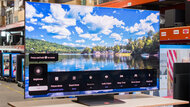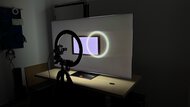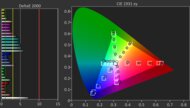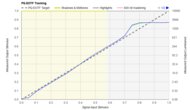For many years, TVs with LED backlights have dominated the market. Manufacturers release many LED models every year that have different features. You won't get the same excellent dark room picture quality as an OLED, but LED TVs have a few advantages compared to OLEDs (check out our article about OLED vs. LED). LED TVs' biggest advantage is their brightness, which allows them to get brighter than most OLEDs, and they're immune to permanent burn-in. However, with the rise of local dimming technology, we've discovered through testing that the best LED models also have excellent contrast ratios, giving them solid dark room performance as well.
LED TVs are also sometimes called LCDs instead. LED refers to the technology used to create the backlight, whereas LCD refers to the technology used to produce different colors and shades. As all LCD models currently on the market use LED backlights, the two terms are often used interchangeably. Check out this guide to learn more about LED TVs and how they work.
Below are our recommendations for the best LED televisions you can buy. See also our picks for the best Mini LED TVs, the best gaming TVs, and the best QLED TVs, or vote on which ones you want us to buy and test. To learn more about the current models on the market, check out our 2025 TV lineup page.
Quick Look





We buy and test dozens of TVs yearly, taking an objective, data-driven approach to deliver results you can trust. Our testing process is complex, with hundreds of individual tests that take over a week to complete. Most of our tests are done with specially designed test patterns that mimic real content, but we also use the same sources you have at home to ensure our results match the real-world experience. We use two main tools for our testing: a Colorimetry Research CR-100 colorimeter and a CR-250 spectroradiometer.
-
Best LED TV
 Gaming7.7Home Theater8.6Bright Room8.5Mixed Usage8.4Sports8.5Brightness9.0Black Level8.7Color8.5Processing (In Development)8.7Game Mode Responsiveness6.5Resolution4kNative Refresh Rate120HzScreen FinishGlossyPanel TypeLCDSub-TypeVASee all our test resultsDolby VisionYes
Gaming7.7Home Theater8.6Bright Room8.5Mixed Usage8.4Sports8.5Brightness9.0Black Level8.7Color8.5Processing (In Development)8.7Game Mode Responsiveness6.5Resolution4kNative Refresh Rate120HzScreen FinishGlossyPanel TypeLCDSub-TypeVASee all our test resultsDolby VisionYesThe Sony BRAVIA 9 is not only the best LED TV on the market, it's the best non-OLED TV you can buy. Its superb SDR brightness means it easily overcomes glare from the brightest indirect light sources, so as long as you don't have a lamp or window facing the screen, you aren't distracted by reflections on your TV screen. As impressive as this TV is in a bright room, it's also spectacular for use in a dark room. Its black levels aren't quite as good as an OLED, but it still has exceptional contrast that delivers incredibly deep, bold blacks for an LED TV, with essentially no blooming. It's also a great option for 4k Blu-ray collectors or those looking to get the most out of high-quality streaming services due to its support for Dolby Vision and DTS audio formats.
The TV's image processing is excellent, and it's also very accurate in both SDR and HDR, delivering an image that respects the content creator's intent. Although its viewing angle is wider than most other LED TVs, it's still not wide enough for large group settings, although it's fine if you're watching from a slight angle. The TV has HDMI 2.1 bandwidth, 4k @ 120Hz, and VRR, but there's noticeable motion blur in faster games, and it has higher input lag than competing models from other brands. You still get a solid gaming experience on this model, but it's not quite at the level of other high-end TVs on the market.
-
Best Mid-Range LED TV
 Gaming8.4Home Theater8.6Bright Room8.4Mixed Usage8.4Sports8.3Brightness9.1Black Level9.2Color8.0Processing (In Development)7.8Game Mode Responsiveness8.0Resolution4kNative Refresh Rate144HzScreen FinishGlossyPanel TypeLCDSub-TypeVASee all our test resultsDolby VisionYes
Gaming8.4Home Theater8.6Bright Room8.4Mixed Usage8.4Sports8.3Brightness9.1Black Level9.2Color8.0Processing (In Development)7.8Game Mode Responsiveness8.0Resolution4kNative Refresh Rate144HzScreen FinishGlossyPanel TypeLCDSub-TypeVASee all our test resultsDolby VisionYesThe Sony BRAVIA 9 is a very expensive TV and is a hard purchase to justify for most people, but you can get surprisingly similar picture quality overall from the TCL QM8K. It's not quite as bright in SDR as the Sony, but it's still plenty bright enough to overcome glare from indirect light sources. Just like the Sony, mirror-like reflections are visible on the screen during darker scenes, so avoid placing any light sources facing the screen. The TV's blacks are just as deep, albeit with a tiny bit more haloing. Colors are equally as vibrant, but they aren't nearly as accurate. Furthermore, the QM8K doesn't have the same level of image processing, so you don't get the refined image you do on the Sony when watching low-resolution and low-quality content. Sadly, its viewing angle is narrow, so stay centered to the screen for the best image quality.
Fortunately, the TV has better gaming performance than the Sony. It has two HDMI 2.1 ports capable of 4k @ 144Hz and 1080p @ 288Hz. You also get VRR for a nearly tear-free experience. Not only does it offer higher refresh rates, but there's less motion blur on this TV, so motion in faster games looks crisper. Input lag is also a lot lower, so it offers a more responsive feel while gaming. It even offers Dolby Vision, HDR10+, and DTS audio passthrough, so movie fans are completely covered in terms of formats. Despite its image quality being a bit less refined than the Sony, it's still one of the best non-OLED TVs on the market.
-
Best Budget LED TV
 Gaming7.2Home Theater7.2Bright Room7.0Mixed Usage7.1Sports7.1Brightness6.5Black Level7.6Color7.2Processing (In Development)7.0Game Mode Responsiveness7.9Resolution4kNative Refresh Rate144HzScreen FinishGlossyPanel TypeLCDSub-TypeVASee all our test resultsDolby VisionYes
Gaming7.2Home Theater7.2Bright Room7.0Mixed Usage7.1Sports7.1Brightness6.5Black Level7.6Color7.2Processing (In Development)7.0Game Mode Responsiveness7.9Resolution4kNative Refresh Rate144HzScreen FinishGlossyPanel TypeLCDSub-TypeVASee all our test resultsDolby VisionYesIf you're looking for something more budget-oriented, but you want modern gaming features and a TV that still has pretty good picture quality, the TCL QM6K is a great choice. It's not nearly as bright as the TCL QM8K, but it still does a good job handling glare from indirect light sources. What really makes this TV stand out in the sea of budget models is its local dimming, which helps the TV display deep blacks. However, there's more noticeable haloing around highlights and subtitles than there is on the more expensive TCL model. Colors aren't as vivid as that TV, and they lack some punch, but it's still colorful enough that the image doesn't look dull. Unfortunately, the TV's image processing isn't nearly as good, so low-resolution content looks a bit soft, and low-bitrate content has visible artifacts.
Even though this model is a lot more affordable than the QM8K, you still get the exact same core gaming features, so you get support for 4k @ 144Hz, 1080p @ 288Hz, and VRR. It even has similarly fast pixel transitions, so motion blur is kept to a minimum. Furthermore, you still get the same low input lag, which is great. It even supports Dolby Vision, HDR10+, and DTS audio passthrough. The TV's viewing angle is just as narrow as its more expensive sibling, so it looks its best when viewed from the front of the screen.
-
Best Cheap LED TV
 Gaming6.2Home Theater5.8Bright Room6.3Mixed Usage6.0Sports6.0Brightness5.6Black Level4.9Color6.8Processing (In Development)6.3Game Mode Responsiveness6.7Resolution4kNative Refresh Rate60HzScreen FinishGlossyPanel TypeLCDSub-TypeVASee all our test resultsDolby VisionYes
Gaming6.2Home Theater5.8Bright Room6.3Mixed Usage6.0Sports6.0Brightness5.6Black Level4.9Color6.8Processing (In Development)6.3Game Mode Responsiveness6.7Resolution4kNative Refresh Rate60HzScreen FinishGlossyPanel TypeLCDSub-TypeVASee all our test resultsDolby VisionYesYou're not going to get the best image quality or a big set of features from a cheap TV, but you can still get an okay model like the Hisense QD6QF. Unlike every other LED model on this list, it doesn't have local dimming, so blacks look gray during most scenes. It's too dim in HDR for highlights to pop out as they should. Furthermore, colors also look a bit muted, but the TV still displays a wide range of colors, so HDR content doesn't look bad. Fortunately, the TV is bright enough in SDR to handle glare in a room with moderate lighting. It does a poor job removing artifacts from heavily compressed content, but it does a decent job upscaling, so low-resolution content looks alright. Its viewing angle is about the same as the TCL QM6K's, so it's best to avoid watching the TV from an angle when possible.
The TV is pretty light on gaming features, but you can still game in 4k @ 60Hz with VRR, so screen tearing is kept to a minimum. It does give you the option of gaming in 1440p @ 120Hz, but that mode is really held back by its unusually high input lag. Pixel response times are also a bit slow on this model, which leads to visible blur behind fast motion. Despite being cheap, it offers Dolby Vision, HDR10+, and DTS audio passthrough, so it has excellent compatibility.
Notable Mentions
-
Sony BRAVIA 7:
The Sony BRAVIA 7 is a good choice for those who want a Sony TV but can't afford the pricey Sony BRAVIA 9. It has a narrower viewing angle, blacks aren't as deep, and it has noticeably worse reflection handling. However, you get similar brightness, the same gaming features, and almost identical image processing, so it's a good choice if you want a Sony model.
See our review -
Hisense U8QG:
The Hisense U8QG competes with the TCL QM8K, and the two TVs are similar overall. The Hisense is even brighter and has a slightly wider viewing angle. On the other hand, the QM8K has better black levels and better motion handling, and it offers a superior HDR experience, making it the better TV all-around.
See our review -
TCL QM7K:
If you want something better than the TCL QM6K, but the QM8K is too expensive, the TCL QM7K is a very solid option. It's not as bright as the QM8K, and its colors aren't quite as vibrant, but it still outperforms the QM6K by a good margin when it comes to those things. Furthermore, it has superior black levels than the QM6K, so it's the perfect middle ground between those two models.
See our review -
Hisense U65QF:
The Hisense U65QF competes with the TCL QM6K but offers more brightness. However, the Hisense really overbrightens HDR content, so it doesn't stay true to the content creator's intent. The TCL offers a more well-rounded experience, with better black levels, superior accuracy, 1080p @ 288Hz, and lower input lag.
See our review -
TCL S551G:
If gaming performance is your primary concern, the TCL S551G is a solid alternative to the Hisense QD6QF. The Hisense is brighter and has better image quality overall, but the TCL offers up to 1440p @ 120Hz with VRR and low input lag, giving it better gaming performance for those who prefer frames over resolution.
See our review
Recent Updates
Nov 13, 2025:
Replaced the TCL Q651G with the Hisense QD6QF in the 'Best Cheap LED TV' category, and added the TCL S551G to the Notable Mentions.
Aug 21, 2025:
We replaced the Hisense U8N with the TCL QM8K, the Hisense U6N with the TCL QM6K, and the Hisense A7N with the TCL Q651G. We also refreshed the Notable Mentions and updated some text throughout the article for accuracy.
Feb 27, 2025:
Added a link to our 2025 Lineup page and confirmed the accuracy of our current picks.
Dec 06, 2024:
We changed some text throughout the article for clarity.
Sep 11, 2024: Replaced the Hisense U6/U6K and the Hisense U8/U8K with their 2024 successors in the 'Best Budget LED TV' and the 'Best Mid-Range LED TV' categories. We also refreshed the notable mentions section to bring it up to date.
All Reviews
Our recommendations above are what we think are currently the best LCD TVs to buy for most people in each price range. We factor in the price (a cheaper TV wins over a pricier one if the difference isn't worth it), feedback from our visitors, and availability (no TVs that are difficult to find or almost out of stock everywhere).
If you would like to do the work of choosing yourself, here is the list of all our LED TV reviews. Be careful not to get too caught up in the details. While no TV is perfect, most TVs are great enough to please almost everyone, and the differences are often not noticeable unless you really look for them. Also, keep in mind that our scores aren't comparable across different test benches, so the older TVs in the list below score higher than they would today.












